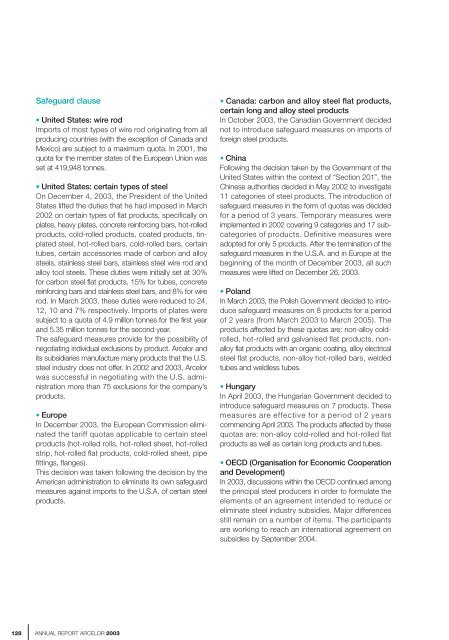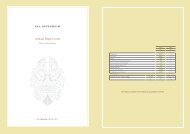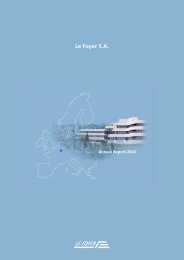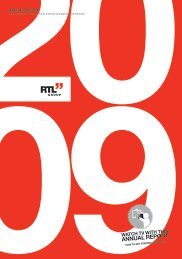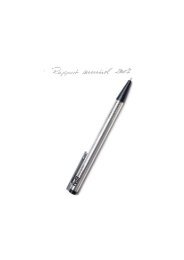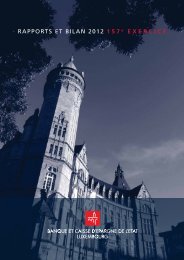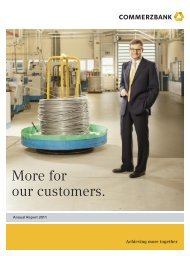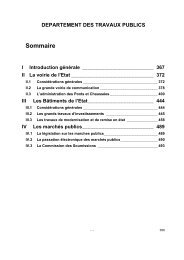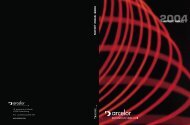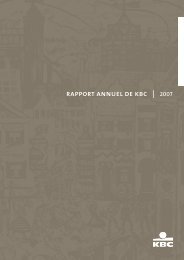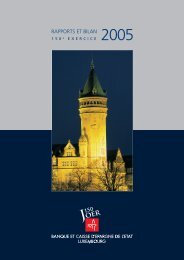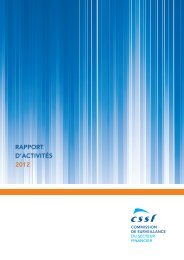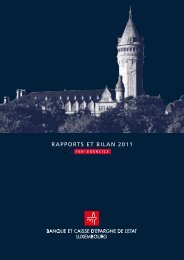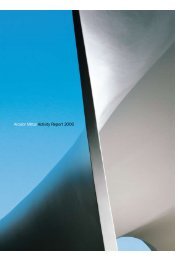ANNUAL REPORT ARCELOR 2003 - paperJam
ANNUAL REPORT ARCELOR 2003 - paperJam
ANNUAL REPORT ARCELOR 2003 - paperJam
You also want an ePaper? Increase the reach of your titles
YUMPU automatically turns print PDFs into web optimized ePapers that Google loves.
Safeguard clause• United States: wire rodImports of most types of wire rod originating from allproducing countries (with the exception of Canada andMexico) are subject to a maximum quota. In 2001, thequota for the member states of the European Union wasset at 419,948 tonnes.• United States: certain types of steelOn December 4, <strong>2003</strong>, the President of the UnitedStates lifted the duties that he had imposed in March2002 on certain types of flat products, specifically onplates, heavy plates, concrete reinforcing bars, hot-rolledproducts, cold-rolled products, coated products, tinplatedsteel, hot-rolled bars, cold-rolled bars, certaintubes, certain accessories made of carbon and alloysteels, stainless steel bars, stainless steel wire rod andalloy tool steels. These duties were initially set at 30%for carbon steel flat products, 15% for tubes, concretereinforcing bars and stainless steel bars, and 8% for wirerod. In March <strong>2003</strong>, these duties were reduced to 24,12, 10 and 7% respectively. Imports of plates weresubject to a quota of 4.9 million tonnes for the first yearand 5.35 million tonnes for the second year.The safeguard measures provide for the possibility ofnegotiating individual exclusions by product. Arcelor andits subsidiaries manufacture many products that the U.S.steel industry does not offer. In 2002 and <strong>2003</strong>, Arcelorwas successful in negotiating with the U.S. administrationmore than 75 exclusions for the company’sproducts.• EuropeIn December <strong>2003</strong>, the European Commission eliminatedthe tariff quotas applicable to certain steelproducts (hot-rolled rolls, hot-rolled sheet, hot-rolledstrip, hot-rolled flat products, cold-rolled sheet, pipefittings, flanges).This decision was taken following the decision by theAmerican administration to eliminate its own safeguardmeasures against imports to the U.S.A. of certain steelproducts.• Canada: carbon and alloy steel flat products,certain long and alloy steel productsIn October <strong>2003</strong>, the Canadian Government decidednot to introduce safeguard measures on imports offoreign steel products.• ChinaFollowing the decision taken by the Government of theUnited States within the context of “Section 201”, theChinese authorities decided in May 2002 to investigate11 categories of steel products. The introduction ofsafeguard measures in the form of quotas was decidedfor a period of 3 years. Temporary measures wereimplemented in 2002 covering 9 categories and 17 subcategoriesof products. Definitive measures wereadopted for only 5 products. After the termination of thesafeguard measures in the U.S.A. and in Europe at thebeginning of the month of December <strong>2003</strong>, all suchmeasures were lifted on December 26, <strong>2003</strong>.• PolandIn March <strong>2003</strong>, the Polish Government decided to introducesafeguard measures on 8 products for a periodof 2 years (from March <strong>2003</strong> to March 2005). Theproducts affected by these quotas are: non-alloy coldrolled,hot-rolled and galvanised flat products, nonalloyflat products with an organic coating, alloy electricalsteel flat products, non-alloy hot-rolled bars, weldedtubes and weldless tubes.• HungaryIn April <strong>2003</strong>, the Hungarian Government decided tointroduce safeguard measures on 7 products. Thesemeasures are effective for a period of 2 yearscommencing April <strong>2003</strong>. The products affected by thesequotas are: non-alloy cold-rolled and hot-rolled flatproducts as well as certain long products and tubes.• OECD (Organisation for Economic Cooperationand Development)In <strong>2003</strong>, discussions within the OECD continued amongthe principal steel producers in order to formulate theelements of an agreement intended to reduce oreliminate steel industry subsidies. Major differencesstill remain on a number of items. The participantsare working to reach an international agreement onsubsidies by September 2004.128<strong>ANNUAL</strong> <strong>REPORT</strong> <strong>ARCELOR</strong> <strong>2003</strong>


